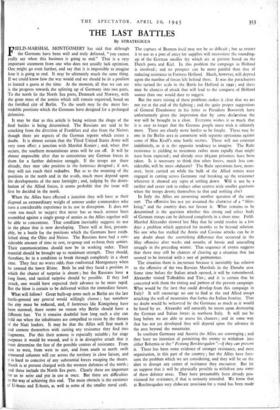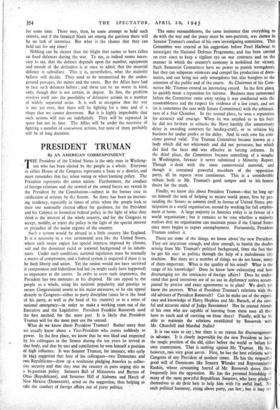THE LAST BATTLES
By STRATEGICUS It may be that as this article is being written the shape of the final battles is being determined. The Russians are said to be attacking from the direction of Frankfurt and also from the Neisse, though there are aspects of the German reports which create a doubt. It is almost certain that the Third United States Army will very soon effect a junction with Marshal Koniev ; and, when that occurs, the southern mountainous areas will be cut off. It will be almost impossible after that to concentrate any German forces in them for a further defensive struggle. If the troops are there already, they may take position in the fortresses designed ; if not, they will not reach their redoubts. But as to the manning of the positions in the north and in the south, much must depend upon the developments of the next fortnight ; and, judging by the distri- bution of the Allied forces, it seems probable that the issue will first be decided in the north.
When the Allies have effected a junction they will have at their disposal an extraordinary weight of armour under commanders who have a considerable experience in its use in disruption. It does not seem too much to suggest that never has so much armour been assembled against a single group of armies as the Allies together will be able to concentrate. That condition inevitably suggests its use in the phase that is now developing. There will at first, presum- ably, be a battle for the positions which the Germans have estab- lished along the Oder and Neisse. The Russians have had a con- siderable amount of time to rest, re-group and re-form their armies. Their communications should now be in working order. Their material should be brought up to maximum strength. They should, therefore, be in a condition to break through completely in a .short time. They face no worse odds than confronted Montgomery when he crossed the lower Rhine. Both he and they faced a position in which the chance of surprise is absent ; but the Russians have long front, and tactical surprise should be possible. If they had struck, one would have expected their advance to be more rapid. But the blow is certain to be delivered within the immediate future.
What will follow? Great built-up areas such as Berlin are the last battle-ground any general would willingly choose ; but somehow the city must be reduced, and, if fortresses like Konigsberg have been stormed, there seems no reason why Berlin should have• a different fate.' Yet it remains doubtful how long such a city can hold out when the inhabitants are compelled to resist by the threats of the Nazi leaders. It may be that the Allies will first mask it and content themselves with cutting any resistance they find into fragments. For this their armour is especially suitable ; for siege Purposes it would be wasted, and it is in disruptive attack that it must determine the fate of the possible centres of resistance. From east to west, from west to east, and from ,south to north swift armoured columns will cut across the territory in close liaison, and it is hard to conceive of any substantial forces escaping the shears. Busch is at present charged with the western defences of the north ; and these include the North Sea ports. Clearly these are important for us to seize and put in use at once. But there are difficulties in the way of achieving this end. The main obstacle is the existence of U-boats and E-boats, as well as some of the smaller naval craft.
The capture of Bremen itself may not be so difficult ; but to restore it to use as a port of entry for supplies will necessitate the rounding- up of the German smaller fry which are at present based on the Dutch ports and Kiel. In this problem the campaign in Holland is involved ; and no prospect can be more painful than that of reducing resistance in Fortress Holland. Much, however, will depend upon the number of forces left behind there. It was the parachutists who turned the scale in the Battle for Holland in 1940 ; and there may be chances of attack that will lead to the conquest of Holland sooner than one would dare to suggest.
But the mere raising of these problems makes it clear that we are not yet at the end of the fighting ; and the quite proper suggestions of General Eisenhower in his letter to President Roosevelt have unfortunately given the impression that by some declaration the war will be brought to a close. Everyone wishes it so much that it is easy to forget that the German people must wish it infinitely more. There are clearly more battles to be fought. There may be one in the Berlin area in connexion with separate operations against some of Max Krull's nine battle sectors. These will not continue indefinitely, as it is the opposite tendency to imagine. The Ruhr resistance is yielding to treatment rathet more rapidly than might have been expected ; and already over 263,000 prisoners have been taken. Is it necessary to thin([ that other forces, much less con- siderable, will be more obdurate? The Ruhr operations have, more- over, been carried on while the bulk of the Allied armies Were engaged in cutting across Germany ond breaking up the resistance wherever it showed any signs of settling down. Will it not be a swifter and easier task to reduce other centres with smaller garrisons when the troops devote themselves to that and nothing else?
In Italy the Allies are answering another question of the same sort. The offensive has not yet assumed the character of a " blitz- krieg," and the country does not favour it. What remains to be determined is the question whether this strong and select body of German troops can be defeated completely in a short time. Field-
Marshal Alexander showed last May that he could resolve in a few
days a problem which appeared for months to be beyond solution. No one who has studied the Anzio and Cassino attacks can be in any doubt about the astonishing difference that occurred in the May offensive after weeks and months of heroic and unavailing struggle in the preceding winter. That sequence of events suggests that there may still be chances of clearing up a situation that has seemed to be invested with a sort of permanence. - The situation there is important because it inevitably has relation to the offensive of the two Russian Marshals in the Danube area.
Some time before the Italian attack opened, it will be remembered, Alexander visited Tolbukhin and Tito ; and it is certain that he concerted with them the timing and pattern of the present campaign.
What would be the best that could develop from this campaign in Italy? It will encourage no one to find at the end Allied troops attacking the wall of mountains that fotins the Italian frontier. That no doubt would be welcomed by the Germans as much as it would be hated by us. Alexander will naturally be intent upon destroying the German and Italian forces in northern Italy. It will not be long before we are able to assess his chances ; and in some way that has not yet developed they will depend upon the advance in the area beyond the mountains.
In southern Germany and Austria the Allies are converging ; and they have no intention of permitting the enemy to withdraW into either Bohemia or the " Festung Berchtesgaden"—if they can prevent it. There has been some evidence of stronger resistance, and even organisation, in this part of the country ; but the Allies have fore- seen the problem which we are considering, and they will be on the alert to disrupt any centre of resistance they encounter. But let us suppose that it will be physically possible to withdraw into some of these defence areas. They have presumably been already pro- visioned for resistance, if that is seriously intended. We know that at Berchtesgaden very elaborate provision for a stand has been made
for some time. There may, then, be some attempt to hold. such centres, and if the fanatical Nazis are among the garrison there will be no lack of intention. But what is the Chance that they can hold out for any time?
Nothing can be clearer than the blight that seems to have -fallen on fixed defences during the war. To say, as indeed seems neces- sary to say, that the defence depends upon the number, equipment and morale of the defenders is at once to admit that the material defence is subsidiary. This it is, nevertheless, what the majority believe will decide. They tend to be mesmerised by the under- ground passages, the mines and the caves. But the Allies have had to face such defences before ; and these can be no worse in kind, only, though that is not certain, in degree. In fine, the problem resolves itself into the possibility of defensive actions in a number of widely separated areas. It is well to recognise that the war is not yet over, that there will be fighting for a time and of a shape that we cannot determine. But it is highly improbable that such actions will run on indefinitely. They will be separated in space but not in time. The Allies will be under the necessity of fighting a number Of concurrent actions, but none of them probably will' be of long duration.



























 Previous page
Previous page